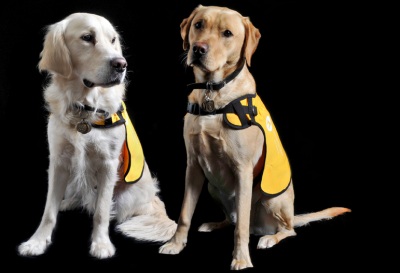

Assistance Dogs are used to help blind people navigate daily life, to assist mobility-impaired people with daily tasks, to be companions to autistic children and to alert diabetics of severly low blood glucose. Scotland now has a program whereby they are training assistant dogs to help elderly people with dementia and their caregivers . These dogs will nudge them if they get agitated, remind them to take medication, alert them if an alarm rings and be their companion throughout their daily living routine. The dogs can help people with dementia maintain their waking, sleeping and eating routine and can improve their confidence and keep them active and engaged in their local community.
The dogs will be taught to support the daily life schedule of the individual with dementia, helping with eating, drinking, washing and toilet use. They will be taught to respond to an alarm set to remind patients to take medication, for instance. Many boomers are caregivers to elderly parents with dementia. These dogs are a great help and offer great companionship to their owners and family.
An assistance dog can be great for orienting a patient in the external environment as well. They are great ice-breakers for conversation and just by getting out and walking them, the patient can feel more at ease and confident.
The Dementia Dog project started as a Glascow School of Art service design project. It got the attention of the Design Council through the Living Well With Dementia Challenge. It is a joint effort between Alzheimer Scotland, the Glascow School of Art, Dogs for the Disabled and Guide Dogs UK. After successful completion of the first funding stage, Dementia Dog has started its pilot phase and has 2 qualified dementia assistance dogs placed with individuals with dementia and their caregivers. The pilot phase runs for one year, but the dog will be supported to remain with the client for its full working life (where appropriate).
So far, the feedback has been overwhelmingly positive. When asked how the dog has helped since he arrived, here are the comments from the patients and caregivers:
Kaspa
“Kaspa has given us our life back. He greets Ken in the morning, so starts Ken’s day being happy. I have noticed if Ken is agitated or unsettled Kaspa gives him a nudge so Ken talks to the dog or goes out in to the back garden and forgets what had bothered him.
Kaspa has removed my fear that Ken had gone, life is so much better for both of us now. Ken is happy and it has taken so much stress away from me as well. Who would believe a dog came into our lives two weeks ago and turned our lives around. Everyday we wake up knowing it’s going to be a good day thanks to Kaspa.”
Oscar
“It has been a life changing experience, Maureen is already responding well to Oscar. Her conversation skills have improved already and she just loves the dog.”
Oscar and Kaspa have been such a success that two more dogs are undergoing the 18 month training session and their sponsor charities say that these dogs could be a great way to help those with early stage dementia.
“Supporting people with dementia and their families to live well with the illness requires innovative and imaginative approaches,” said Joyce Gray, deputy director of development at Alzheimer Scotland.
Here is a short video about the Dementia Dog project:
Living Well With Dementia – Dementia Dog from Dementia Dog on Vimeo.
Sources:
http://dementiadog.org/index.html
http://www.designcouncil.org.uk/our-work/challenges/health/living-well-with-dementia1/solutions1/dementia-dog/
http://www.bbc.co.uk/news/uk-scotland-23277537